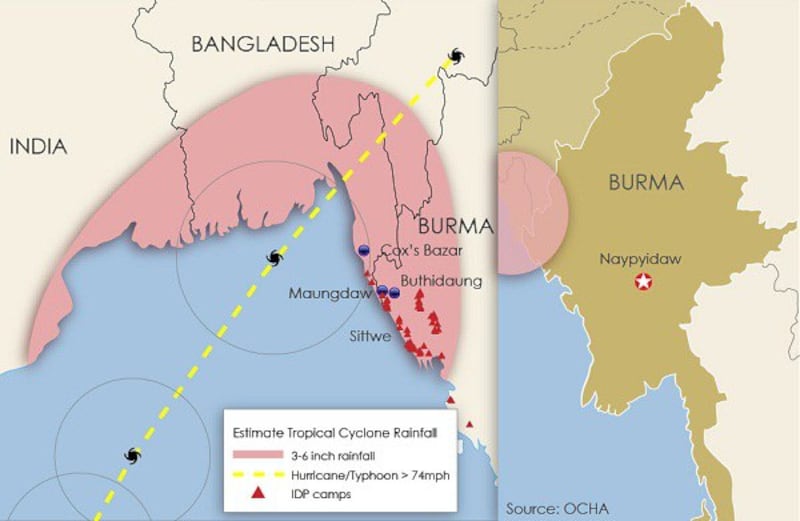Burmese authorities on Wednesday urged tens of thousands of Muslims living in flood-prone camps in Rakhine state to comply with evacuation instructions ahead of a looming cyclone, after some wary of their safety in the wake of ethnic violence refused to move.
Around 140,000 people, mostly ethnic Rohingyas, have been living in tents and makeshift shelters in the coastal state since communal violence forced them from their homes last year, nearly half of them in areas vulnerable to storm surges and flooding from Cyclone Mahasen expected to make landfall late Thursday or early Friday.
Authorities have arranged to relocate tens of thousands in the camps to higher ground, but many have refused to go, saying they fear for their safety in the new locations or that they will not be able to return.
Aung Min, a minister in President Thein Sein’s office, warned Wednesday that authorities will take serious action against those who do not comply with government arrangements to move them to higher ground.
"Some people don't want to move from their homes, but we don't want to see them dead,” he told a press briefing on the cyclone in Rangoon on Wednesday.
“According to the natural disaster management law, entering disaster areas managed by the government and refusing instructions to move to safer areas is also forbidden. The government will punish those who don't follow these instructions to evacuate,” he said.
Deputy Information Minister Ye Htut said those encouraging others to refuse to move “may have action taken against them.”
'Life-threatening conditions'
Officials promised that the government would provide disaster relief to members of all religious communities equally, and urged ethnic communities in Rakhine to put aside their differences to weather the storm.
The U.N. has warned of “life-threatening conditions” for 8.2 million people at risk from the storm along the coasts of India, Bangladesh, and Burma.
New York-based Human Rights Watch said in a statement earlier this week that Muslims in the camps on Burma's coast were also at risk from violence at the hands of ethnic Rakhine communities and local security forces.
Rights groups have accused security forces of complicity in last year's violence between Buddhist Rakhines and Rohingya Muslims, which left at least 192 dead.

Fear and distrust
Tun Wai, a Kaman Muslim leader at a camp in Ramree township had agreed with plans to move into a government hall in the township on Thursday, but others at the camp said they were afraid they would not be safe in the new location.
“I think they have refused because they think that the new location is not safer than where they are,” he told RFA’s Burmese Service.
Others fear that once evacuated they will not be allowed to return, or that the new locations they are assigned to will not have as many provisions.
“I don't want to move. I don't know if there will be food rations in the new place,” one Rohingya man living in a camp in Sittwe told RFA.
Khin Maung Win, a local Rohingya leader in Sittwe, said that members of his community have refused instructions to leave.
“We asked them to evacuate, and yesterday they said they would. But now they don’t want to move,” he told RFA.
The U.N.’s Office of Humanitarian Affairs said in a statement late Tuesday that the storm had weakened to a Category 1 storm, but that it posed “life-threatening conditions.”
In 2008, Burma’s southern delta region was devastated by Cyclone Nargis, which killed more than 130,000 people.
Two days before hitting Burma, Nargis weakened to a Category 1 cyclone before strengthening to a Category 4 storm.
Reported by Zin Mar Win, Khin Khin Ei, and Min Thein Aung for RFA’s Burmese Service. Translated by Khet Mar. Written in English by Rachel Vandenbrink.
